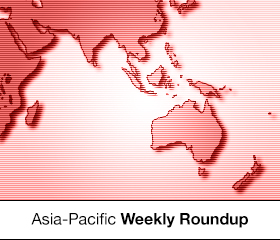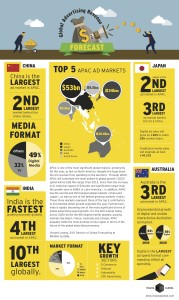InMobi Fined for Secretly Tracking Location Data; China Sets New Laws for Paid Search


In this weekly segment, ExchangeWire sums up key industry updates on ad tech from around the Asia-Pacific region – and in this edition: InMobi fined for secretly tracking location data; China sets new laws for paid search; APAC ad market to hit £93.8bn; Singapore location data firm launches PMP; AU agency expands into NZ; and Amobee appoints ANZ sales head.
InMobi fined for secretly tracking location customer data
The Singapore-based mobile advertising vendor has agreed to pay USD$950,000 (£641,060) following allegations that it tracked consumers' location and delivered geo-targeted ads without their consent or knowledge.
The US Federal Trade Commission (FTC) said InMobi also agreed implement a "comprehensive privacy programme" as part of the settlement.
The US government agency alleged that the Singapore company misrepresented its ad software, which was to only track consumers' location when they had opted in and in accordance with privacy settings on their devices. However, InMobi was found to have done so even when consumers denied permission to access their location data and without first asking for consent, FTC said.
"InMobi tracked the locations of hundreds of millions of consumers, including children, without their consent, in many cases totally ignoring consumers' express privacy preferences", said Jessica Rich, the government agency's director of Bureau of Consumer Protection. "This settlement ensures that InMobi will honour consumers' privacy choices in the future and will be held accountable for keeping their privacy promises."
FTC claimed that the mobile ad firm had gathered data from apps clearly targeted at children without securing consent from their parents.
Under the settlement, InMobi would have to delete all information collected from children and all other location data gathered from consumers who did not give their consent. Its privacy programme also was required to be audited by an independent party every two years for the next 20 years.
Although InMobi would have faced a USD$4m (£2.7m) civil penalty, FTC said this was suspended to the final USD$950,000, based on the vendor's financial condition.
China sets new laws for paid search
The Cyberspace Administration of China has introduced regulations that limit the number of paid results on a webpage and require search engines to clearly identify paid search results.
Under the new rules, search operators also were prohibited from displaying subversive and obscene content and must evaluate the qualifications of clients of paid search.
Local media reports linked the introduction of the regulations to a cancer patient, who had published a post alleging he was misled by giant Baidu to seek treatment at a hospital, which he later found out had not gained approval for the treatment. He blamed the Chinese search for profiteering from the promotion of unproven or less effective medical treatments.
Following the announcement of the new laws, Baidu said it would work with authorities and online community to deliver impartial and trustworthy search results.
In May of this year, the search operator said it had removed 126 million paid search results promoting medical data, as well as more than 2,500 medical institutions from its search pages. It also said it would commit CNY¥1bn (£102.56m) that could be used as compensation for consumers who were misled by promotional results. Baidu further added that it would stop ranking paid searches based on their bidding price.
 APAC ad market to hit £93.8bn
APAC ad market to hit £93.8bn
The Asia-Pacific ad market is projected to climb 6% to generate USD$139bn (£93.8bn) in sales this year; with China retaining its pole position as the region's largest ad market.
The second-largest ad region, after the US, which will push USD$178bn (£120.11bn) in 2016, the Asia-Pacific ad market still would be dominated by television, according to the latest stats from Magna Global. Digital media, though, remained the primary growth driver for the region, thanks to social media and video.
Search was expected to still be the largest digital media format, accounting for more than half of total digital spend, while mobile would be the primary driver across all digital formats. By 2020, ads on mobile devices would account for 70% of budgets, said Magna.
Its executive vice president and director of global forecasting, Vincent Letang, said: "Asia-Pacific is one of the most significant global regions, growing by 6% this year [and] as fast as North America, despite the huge boost the US receives from spending on the election.
"Through 2020, Asia-Pacific will contribute the most dollars to global growth [with] spend USD$38.9bn (£26.25bn) larger than 2015", Letang said, noting that this would be more than the increase in North America's spend of USD$36.6bn (£24.7bn), and significantly larger than the growth seen in EMEA or Latin America.
He added that Asia-Pacific was home to both the second- and third-largest global markets, China and Japan, as well as one of the fastest growing markets, India.
"Those three markets represent three of the top five contributors to incremental dollar growth expected this year", he said. India also was becoming one of the most significant drivers of global advertising spend growth, Letang said, climbing from number 10 to become the sixth-largest global ad market by 2020, and bypassing markets such as Australia, France, and Brazil.
According to Magna, China's ad revenue would climb 8.4% this year to CNY¥335bn (£34.36bn), while Japan's would grow 2.5% to JPY¥4.1tn (£26.3bn). The Indian ad spend in 2016 was projected to expand 16.2% to INR₹564bn (£5.64bn).
Across the 72 markets Magna analysed, it said that all but five were projected to clock ad revenue growth this year, pointing to Singapore, Hong Kong, Finland, Ecuador, and Kazakhstan.
Singapore location data firm launches PMP
Singapore-headquartered Blis has introduced a private marketplace for location-based advertising, touting it to be "the world's largest" of its kind.
Called 'Blis Prime', the platform promised to provide a "customisable marketplace guaranteeing access to high-end publishers", as well as data and exclusive ad forms that would not be available in the open market.
Blis CEO Greg Isbister said: "Blis Prime combines the huge insight of location data with the quality and pricing benefits of private market deals."
The vendor also inked a partnership with analytics firm, Moat, to offer ad viewability and attention metrics within the Prime marketplace.
AU agency expands into NZ
Melbourne-based agency Thrive has opened two new offices in Brisbane and Auckland, as it looks to expand into the New Zealand market.
Thrive, which also has an office in Sydney, had run campaigns across Queensland, but only now will have a direct presence. It also delivered campaigns in New Zealand for clients such as Tag Heuer and Mattel.
Thrive said on its website: "Brisbane represents a sensational opportunity for us to cement our local and regional work with current clients and extend our work with other national brands. In Auckland, we will be working with Australian and global companies looking to expand into the New Zealand market, along with local companies who are seeking a new, high-impact PR offering."
It will be looking to beef-up its headcount in both Brisbane and Auckland.

Henrik Isaksson
Amobee appoints ANZ sales head
The Singtel subsidiary has hired a former Spotify executive as its new sales director for the ANZ market.
Henrik Isaksson had previously launched operations for Spotify in ANZ and helped set up the music streaming company's local advertising sales operations.
At Amobee, Isaksson would be responsible for driving the mobile ad vendor's sales operations in New South Wales and Queensland, focusing on signing up brands data-driven advertising services.
"We are witnessing an unparalleled rise in mobile content consumption that will see data and technology at the forefront of innovative advertising solutions", he said. "I look forward to blending mobile advertising innovation with data-led brand integrations that deliver strong results for advertisers."
AdvertiserAgencyAPACAustraliaChinaIndiaLocationMedia SpendMobilePMPProgrammaticSearchSingapore








Follow ExchangeWire